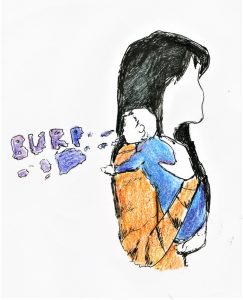
Author: Layal Bou Abdo, MSN
Illustrator: Angeline Boswell
22/12/2021
 Have you ever wondered why humans are so gross?
Have you ever wondered why humans are so gross?
Zits, sweat, mucus, bloggers, dandruff, ear wax, smelly feet and pumping gas are gross but being gross helps us survive.
Your body fluids, particles and substances may be sticky, smelly, disgusting, but your body needs every single substance to function properly.
We have covered in a previous blog, why do we pass gases and all about bacteria that live inside us.
Why does our sweat smell?
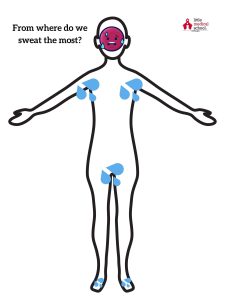 Your sweat is your natural air-condition. Your skin sweats to cool you off when you exercise or get hot. If you don’t sweat enough, your body could be at risk of overheating.
Your sweat is your natural air-condition. Your skin sweats to cool you off when you exercise or get hot. If you don’t sweat enough, your body could be at risk of overheating.
Water makes 99% of your sweat while fat and salt make 1%. Did you figure out now, why your sweat has a salty taste?
You might also sweat because you are nervous. Sweat glands are stimulated by emotions.
Sweat is odourless. When sweat is eaten by bacteria living on the skin, they grow and dispose of waste in form of organic acids. Consequently, they cause a bad stinky smell. You sweat the most under your armpits, groin, palms and soles of your feet. Bacteria form in these areas of the body because these areas are dark and wet.
There are two types of sweat glands:
- Eccrine glands occur over most of your body and open directly onto the surface of your skin.
- Apocrine glands open into the hair follicle, leading to the surface of the skin.
You sweat more during puberty because of hormonal changes. Pregnant women also do sweat a lot.
The medical word to define sweating is perspiration. Hyperhidrosis is a medical condition where the body produces more sweat than normal.
Why do I get zits?
Your skin pores might get blocked by the skin oil, dead skin, bacteria and white blood cells that gave their lives fighting bacteria. When the skin pores are blocked, they form a pimple.
As you get into puberty, your skin starts to produce more oil, the reason why you will have more pimples called acne.
If your skin-blocked pores remain open, the oxygen in the air turns them black. They are called blackheads.
If a blocked pore closes, the top of the bump looks whiter, so it’s called a whitehead.
More gross stuff can grow on the skin:
- Warts are flesh-coloured, white, pink or tan grainy bumps that grow on the skin. They are caused by viruses. They are rough to the touch and occur most often on your fingers or hands.
- Moles are dark brown spots caused by clusters of pigmented cells and can even sprout hairs. Moles generally appear during childhood and adolescence.
Why do I have mucus and boggers?
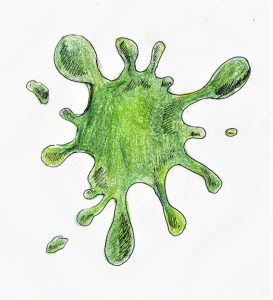 Snot is the mucus or the slimy, stretchy and jiggly stuff in your nose that helps catch dust mites, bacteria, pollen, ash, sand, pollen and germs. With the help of the cilia (the tiny hair in your nose) and the boggers (dried up mucus), mucus can trap this bad stuff and prevent them from sliding down to our lungs. For this reason, this sticky substance serves as security against these invading particles. Otherwise, your breathing becomes difficult. Snots push the particles to the exit (your nostrils) or down to the throat. Without even thinking, you swallow around 7.6 litres of snot each week.
Snot is the mucus or the slimy, stretchy and jiggly stuff in your nose that helps catch dust mites, bacteria, pollen, ash, sand, pollen and germs. With the help of the cilia (the tiny hair in your nose) and the boggers (dried up mucus), mucus can trap this bad stuff and prevent them from sliding down to our lungs. For this reason, this sticky substance serves as security against these invading particles. Otherwise, your breathing becomes difficult. Snots push the particles to the exit (your nostrils) or down to the throat. Without even thinking, you swallow around 7.6 litres of snot each week.
Your snot will be double in quantity when you catch a cold or have an allergic reaction. You will start coughing up globs and phlegm as your body’s way of flushing all the bad stuff away.
The technical term of nose picking is called rhinotillexis.
Why do I sneeze?
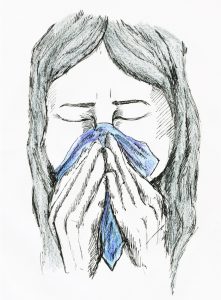 Sneezing is also gross when you propel spit, boogers, chewed food, and other particles at a speed of 100 miles per hour (161 kph). So please be careful when you sneeze and cover your mouth and nose.
Sneezing is also gross when you propel spit, boogers, chewed food, and other particles at a speed of 100 miles per hour (161 kph). So please be careful when you sneeze and cover your mouth and nose.
When something tickles your mucus membrane, you unleash a sneeze.
What can tickle our noses?
Particles like:
- Pollution
- Dust
- Pepper
- Microbes
- Your own boggers
- Flakes of your dead skin
- Allergic reaction
- Virus, like the common cold
Sneezing is an involuntary reaction in which your chest, throat, stomach and face muscles work together to blast your particles from your mouth and nose.
Why do I barf?
When you catch a virus (stomach flu), eat food spoiled by bacteria, or something that irritates your stomach, you will start feeling nausea, and your tummy will hurt you. You will feel bloated until your body rebels to eject whatever is causing the troubles by throwing up.
So vomiting is a good thing because it helps your digestive system get rid of the viruses and bacteria causing you to feel sick.
Why do I poop?
Ew!! That smells!
All human and animal species poop. Pooping is the process at the end of digestion. It is how your body gets rid of the undigested food and bacteria. The appearance, frequency and consistency of your poop can tell you a lot about your health.
Where does poop come from?
Your food passes through different organs before it is transformed into poop.
The digestion starts in the mouth, where you mash and swallow your food. Later, the food passes to the esophagus, stomach and intestines (small and large intestines), and finally to the rectum (the end). The small intestines absorb the broken-down food in form of nutrients to the blood, and the large intestines absorb the remaining water.
Any changes in your poop can indicate either a change in your diet or that your body is dealing with a serious condition.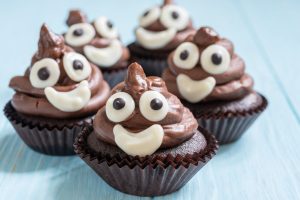
- The colour is the reflection of what you eat.
- Shades of brown are normal.
- The black colour indicates bleeding in the stomach.
- Iron supplements can make the stools dark green.
- Dark red stools indicate bleeding in the large intestine, rectum or anus.
- Pale white or yellow stool can mean a problem in the liver.
- The shape of the stools could also indicate something:
- The dry, hard stool can indicate constipation.
- Soft sticky stools can indicate the presence of too much oil, and usually, it’s a problem in the pancreas (the organ that absorbs fat).
- Diarrhea is unformed stools, loose or watery indicates undigested food caused by an infection in the intestines. Like vomiting, diarrhea is the way the body gets rid of the bad stuff that makes you sick.
- The smell of the poop also can indicate a health status:
- Stools having a foul and strange smell should not be ignored if it usually persists.
Why do I have ear wax?
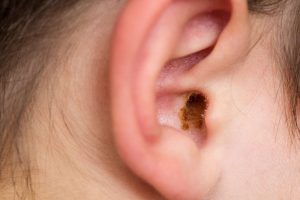 Ear wax is also known as cerumen and is secreted by the glands inside your ear canal. Like boogers, the cerumen is oily and waxy and collects dust, dirt and germs and prevents them from entering inside your ear. Ear wax also helps lubricate the ears, protects the ear canals and has antibacterial properties.
Ear wax is also known as cerumen and is secreted by the glands inside your ear canal. Like boogers, the cerumen is oily and waxy and collects dust, dirt and germs and prevents them from entering inside your ear. Ear wax also helps lubricate the ears, protects the ear canals and has antibacterial properties.
Sometimes your body overproduces cerumen, especially if you’re stressed or afraid. Earwax can vary in colour and texture depending on your health, diet and ethnicity.
Cleaning the ear wax with a cotton tip may injure your ear canal. You might go too deep and perforate your eardrum. You might push more wax in than you remove.
Why do I get eye boogers?
Eye boogers or gunks are the sticky, crusty discharge in the corner of your eyes. Everyone gets eye boogers, and they are completely normal. The other name of eye boogers is rheum. Rheum is made up of thin mucus, skin cells, oils and dust. Your eyes always produce rheum to keep them moisturized. When you are awake, each time you blink, the eyes spread the fluid around and send it down to the tear duct that drains into your nose. However, when you sleep, you don’t blink, and the mucus builds up and dries at the corner of your eyes.
Why do I urinate?
Peeing is one of the ways your body eliminates waste and extra water. After your body extracts the nutrients needed from food, waste products, called urea, are left behind in the blood. Here comes the role of your kidneys. Your kidneys filter the waste from the blood and produce urine. If you don’t pee, you can’t get rid of the waste. Urine colours are shades of yellow.
The colour of the urine can tell a lot about your health.
- A pale yellow indicates diluted urine.
- A dark amber indicates concentrated urine or dehydration.
- Urine can take the colour of the food you eat:
- Red or pink colour urine: Did you eat beets, rhubarb or blueberries? If not, better to check with the doctor if the colour lasts for a long time.
- Orange colour urine: Did you drink enough water? You might be dehydrated.
- Blue or green colour urine: Did you add some food colourants to your food?
- Dark brown urine colour: If you are not dehydrated, it can be a liver problem.
- Cloudy colour urine: It can be an infection or a symptom of some chronic diseases and kidney conditions.
- The smell of the urine can also tell a lot:
- Urine that contains a lot of water and few waste products has little to no odour.
- If urine becomes highly concentrated — a high level of waste products with little water — your urine may have a strong ammonia odour.
- Some medications or food like asparagus or vitamins give a strong urine odour.
- An unusual urine odour indicates a medical condition.
- The frequency of urination is related to many things:
- If you urinate frequently in small amounts, you might have an infection.
- If you urinate frequently, you might have diabetes.
Why do I have Saliva?
The liquid in your mouth helps moisten your mouth, facilitates swallowing, and contains enzymes that break down food and start the digestion process. Saliva helps keep your teeth clean by washing away food particles and helps prevent tooth decay by reducing bacterial growth and fighting infections.
Fun Fact:
Did you know that:
- Right before your sneeze, your brain automatically sends signals to your eyelid to shut tight. The reason why we cannot sneeze while keeping our eyes open.
- You produce about 8 cups of saliva per day.
- Bad breath is caused by bacteria that feed upon the remaining food particles on your teeth and gum.
- Dandruff is the dead epidermis in your skull. It is a common condition that causes the skin on the scalp to flake. Dandruff can be due to irritated, oily or dry skin, a hair care product or a skin condition.
- The Bellybutton or navel is the magnet of dead skin. The dead skin mixed with cloth fibre forms a great environment for the bacteria to live in. The reason why you have a linty belly button.
- Tears, mucus and boogers (eye and nose) are salty, ear wax and poop are bitter and urine is salty(ish) bitter.
- Vomit taste is bitter, sour, well you know it plus it burns because of the high level of acid in it.
Disclaimer: We mentioned some diseases and conditions that might be a reason for the change in the body fluid or substances.
Please note that we mentioned the most common conditions that a child might encounter and this article is not to diagnose any condition that you or your child are facing. Please refer to your physician if you have any doubts.
We are certain your kid asks you health (human & animal) questions that genuinely leave you stumped! Leave a comment below and we are happy to answer “why” in future blogs.
Copyright © 2021 Little Medical School Ottawa

Interesting insights on why certain bodily functions might seem gross.